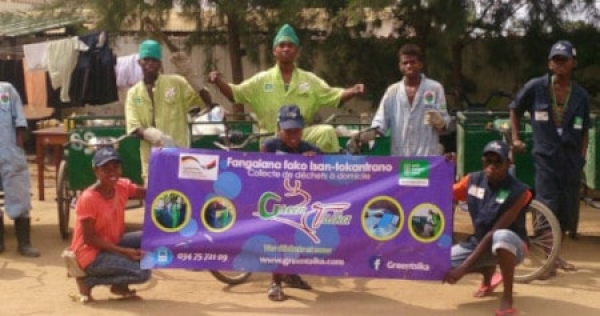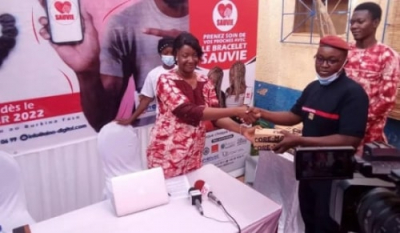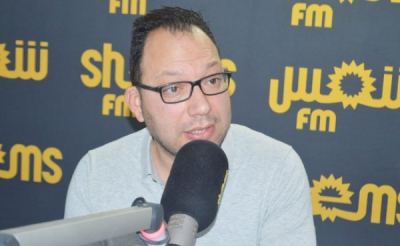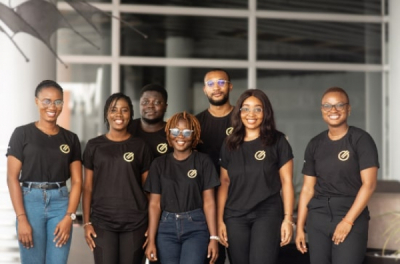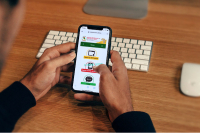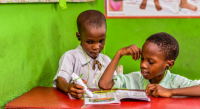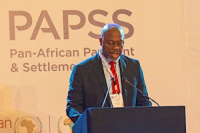
Solutions (560)
Tech4dev announced it is launching a new edition of its women Techsters fellowship. The non-profit social enterprise wants, through this initiative, to bridge the digital divide between men and women in the tech sector.
The training combines theory and practice to give women the opportunity to enter the job market. It is specifically designed for technology novices who are encountering technology for the first time. Applicants for the scholarship must be between the ages of 16 and 40 and reside in one of the following countries: South Africa, Nigeria, Ghana, Kenya, Ethiopia, DR Congo, Tanzania, Uganda, Algeria, South Sudan, Morocco, Angola, Mozambique, Madagascar, and Egypt.
Successful candidates will be trained in the skills of blockchain, cybersecurity, data science and artificial intelligence engineering, mixed reality/3D animation, mobile application development, product design (UI/UX), product management, and software development.
The Women Techsters Fellowship Program aims to increase the number of girls and women with improved livelihoods and access to digital jobs. The program will begin in May 2022 for one year, including 6 months of intensive training, followed by a 6-month internship. At the same time, learners will participate in a mentoring program to help them build technology careers and technology-based businesses. Applications are due by March 22, 2022.
Vanessa Ngono Atangana
Household waste management has been a major problem in African cities for several years. A Malagasy startup has entered the sector using digital technology to protect the planet.
In Madagascar, like the rest of the world, as the population grows, the volume of waste produced also grows; 50% of garbage in the country still ends up in the streets according to the NGO Ran'Eau. In 2017, the local startup Greentsika launched its household waste collection service using digital tools. Tested and deployed in Tuléar, in the south of Madagascar, the solution is the result of a collaboration with the German NGO Welthungerhilfe, which handles the transportation of waste to landfills.
Greentsika’s service is accessible via mobile phone, email, social networks, or directly at the company's offices. The solution offers various means of payment, including mobile money transfers, bank transfers, checks, and cash. The monthly subscription fee for a household starts at 4,000 ariary ($1), for two to six pickups per week of a 50 kg bag of waste. The fee for businesses (hotels, restaurants, schools, government offices, etc.) starts at 20,000 ariary. The subscriber company chooses the days it wants to have the waste collected and the agent who is dedicated to it.
Subscribers are given a card with a barcode that Greentsika's agents will scan at each garbage pickup. The unique barcodes allow Greentsika to have reliable data on the number of pickups made in a household or business. They also enable the startup to know the coverage of its agents and track their routes in real-time, and identify the customers who have paid their subscription. Rajaofera Gaëtan, one of the four co-founders of Greentsika, said the entire system is cloud-based.
Greentsika, accelerated by Orange Fab Madagascar in 2019, already claims 2,300 customers, 160 garbage pickups per day for 7 tons of waste collected daily. The startup aims to cover the entire city of Tulear and enter other cities, creating more job opportunities. In 2020, Rajaofera Gaëtan estimated that 5 to 6% of households in Tulear were covered.
Adoni Conrad Quenum
Burkinabe startup AINO Digital SAS has developed a multi-faceted digital identification bracelet. Called SAUVIE, the device is equipped with a QR code where personal health information and contacts of important people to reach in case of emergency are stored.
With this initiative presented to the public on February 23, AINO Digital SAS wants to ensure that everyone has their personal health information in case of emergency. Scarlett Zongo (pictured, left), CEO of AINO Digital SAS, explains that the solution is "an application for first responders such as firefighters and doctors. Thanks to SAUVIE, the patient's relatives are alerted of the nature of the emergency and the health facility where he or she is being treated". AINO Digital SAS says that for personal safety, the QR codes are encrypted and can only be read by firefighters and health workers using a special device.
AINO Digital SAS donated nine bracelet models to the public when presenting the device. The basic annual cost of the SAUVIE system is $6.83 plus the price of the wristband on which it is mounted (between $1.2 and $1.71). Three billable options are also available with the basic subscription: Alerting the employer in case of emergency ($8.54), Alerting the insurance company ($3.42), and Alerting a relative ($1.71). If the bracelet is stolen, lost, or damaged, the owner must report it to AINO Digital SAS so that the QR code can be canceled. Another one is automatically generated and integrated into the new bracelet.
Supported by Orange Burkina Faso, which does not charge any data fees when reading the QR code, the startup is working with the Ministry of Health to get the solution to be used in health centers and local security services. Scarlett Zongo is convinced that her innovation can improve the health system in Burkina Faso.
Adoni Conrad Quenum
The Tunisian transport market has welcomed, since 2016, a new operator. eFret.tn is an innovative startup that connects shippers (individuals or companies) with transport and transit companies. It operates an online market platform where shippers describe their needs and receive free quotes from carriers, movers, and international transport companies as well as customs agents.
With this method, carriers can offer competitive rates, optimize their routes through grouping and also reduce empty returns. After delivery, the carriers are evaluated twice both by the site and the customers.
eFret.tn was created in 2016 by two partners specialized in e-commerce, e-business, and logistics. The idea was to simplify logistics in Tunisia and optimize transport by making it cheaper and facilitating the obtention of transport quotes. The platform takes into account different types of services, including local land transport (moving, parcels, transport of goods within Tunisia); international air transport (transport of goods, parcels, and freight, to and from Tunisia in import or export); international maritime transport (transport of goods, containers, and goods to or from Tunisia); customs transit (freight forwarder service to carry out the customs formalities for all import or export operations to or from Tunisia).
eFret.tn is a sort of transport exchange that makes the activity more optimized and economical. Co-founder Wajdi Ben Rejeb (pictured) explains that by optimizing the movements of carriers through the grouping and management of empty returns, the startup can reduce CO2 emissions and help preserve the environment. This innovation earned it the 2017 Orange Social Entrepreneurship Award. Wajdi Ben Rejeb pointed out that obtaining this award has helped increase tenfold the number of ads from shippers on the platform.
Ruben Tchounyabe
The application was born out of the desire of the startup Nchimsy Teq to make Cameroon a top travel destination in the world. TourCmr showcases both sung and unsung places in the country.
The TourCmr app is a bilingual digital travel guide designed by the startup Nchimsy Teq, founded by Bryan Pemwoya Pangsui (pictured). Approved by the Ministry of Tourism and Leisure as an official tourism promotion app in Cameroon, the solution was officially launched on November 2, 2021. It features more than 150 tourist sites classified by cities and surroundings, in the ten regions of Cameroon, with descriptions, photos, and videos.
“This digital guide gives its users information about sites to visit across the country. Information is available about hotels, restaurants, and bus stations. The user can design their own tourist route with the app," explains Armand Noah, head of communication at the Ministry of Tourism and Leisure. Nchimsy Te worked with the ministry to develop the travel guide.
The app can work without the internet. It is downloadable on Play Store and App Store. In addition to tourist sites, TourCmr also allows visitors to find hotels, restaurants, banks, and supermarkets around the site they want to visit. Users can also book travel services and pay via mobile money. The "find the embassy" function provides tourists with information on all embassies in Cameroon, including contacts, location, and directions.
Nchimsy Teq aims to build the largest travel and booking platform for Cameroon. This will also stimulate domestic tourism as several tourist sites listed in the app are also unknown by Cameroonians. According to Bryan Pemwoya Pangsui, the travel app has already recorded over 9,000 downloads on Android and IOS.
Ruben Tchounyabe
Earnipay, which launched as a pilot last September, has already attracted the interest of investors. The fintech aims to reach nearly 200,000 employees with its flexible, on-demand payroll service by the end of 2022.
Earnipay, the Nigerian fintech that offers employees flexible and regular access to their salaries, has secured $4 million in pre-seed funding to accelerate its business in the country.
“Earnipay has quickly established itself with a product built specifically for the payroll behaviors of this region, and early employer uptake is very strong. Nonso (the MD, ed) has built one of the strongest teams that we’ve met on the entire continent, and we’re thrilled for the opportunity to partner with them,” said Brendan Dickinson, general partner at Canaan, the VC firm that led the deal.
After he faced employee departures due to the monthly payroll system instituted at his first-ever plastic waste recycling company, which launched in 2019 in Ghana, Nonso Onwuzulike decided to revamp that payment method by offering a more regular and flexible employee payroll system as part of a new business venture in Nigeria.
Earnipay, which was only launched on a trial basis last September, claims to have served employees of about 20 companies in Nigeria to date. Its app has been used more than 1,000 times. Confident in its growth prospects, Earnipay aims to offer its flexible, on-demand salary access service to at least 200,000 employees by the end of this year.
In Nigeria, salaries for employees in the formal sector are paid monthly, while those in the informal sector are paid daily, according to several local media. Short of cash between paychecks, employees have no other option than to borrow or to ask for an advance on their salary with sometimes high-interest rates. Earnipay's solution is therefore a relief for these employees.
Chamberline Moko
Led by the AfCFTA Secretariat, in collaboration with African regional economic communities and governments, the solution addresses the challenges related to the cumbersome process of implementing a single market.
On January 1, 2021, the African Continental Free Trade Area (AfCFTA) came into effect. Supported by 54 countries, its objective is to create a single continental market that promotes the free flow of goods and services. Given the size of the measures that must be undertaken by every member country, and to ensure the successful implementation of the market, the AfCFTA secretariat has developed the digital tool tradebarriers.africa. The latter is a kind of customer service that will allow African entrepreneurs to report cases of non-tariff barriers (NTBs) within the market. NTBs include excessive border fees, cumbersome documentation requirements, or restrictive product regulations.
NTBs are classified into seven categories: government participation in trade and restrictive practices tolerated by governments, customs, and administrative entry procedures, technical barriers to trade, sanitary and phytosanitary measures, specific limitations, charges on imports, others (transport, clearing, and forwarding, etc.).
To report an NTB, the user must first register on the platform by filling out a form. Next, they activate their registration on tradebarriers.africa via a link sent to the email address provided during registration for confirmation. Once this step is completed, the account is active, the reporting of an NTB is done with the "Report an NTB" button. A reporting form is then proposed to the user with information to be filled in.
According to the AfCFTA secretariat, once a non-tariff barrier is reported, the governments concerned will follow up to resolve the problem. The NTB coordination units of the secretariat, those of the regional economic communities, and the national focal points will support the process. The complainant can find out about his or her complaint - whether it is still being processed or resolved - directly on the platform, which is available in English, French, Arabic, and Portuguese.
For greater efficiency in reporting non-tariff barriers, the AfCFTA Secretariat is currently working on a service that will be accessible on mobile phones.
Adoni Conrad Quenum
UK-based mobile satellite communication provider Inmarsat announced a partnership with RLTT Digital Oilfields to provide digital solutions to oil operators in Libya. The announcement was made on February 2.
The partnership will leverage Inmarsat's IsatData Pro (IDP) and BGAN technologies to provide secure satellite-based data services to oil and gas producers. This will enable comprehensive monitoring of vital infrastructure, including wellheads at oil and gas drilling sites and production sites in oil basins. Producers will therefore be able to anticipate problems related to the deterioration of key assets on platforms, replace faulty equipment timely, and better plan maintenance work. The solution will help optimize production at the sites.
The partners plan to expand the offering to include monitoring, telemetry, tracking, and fleet management. The services will be provided by Inmarsat's ELERA L-band connectivity network, which boasts ultra-reliable 99.9% availability and small, robust terminals.
“Inmarsat’s experience in providing IoT-over-satellite connectivity for the industry means that it understands the types of products and services we want to offer to the oil and gas sector in Libya […] Operators across the country are digitalizing their operations to increase efficiency and output and improve on-site safety and security for staff. Our new partnership with Inmarsat puts RLTT in an excellent position to take full advantage of this growth opportunity,” said Taha Ellafi, Chairman at RLTT.
Commenting on the partnership, Mike Carter, President of Inmarsat Enterprise, said: “As the industry automates its infrastructure and its processes to enable remote monitoring and asset management, it reduces the need to travel to remote, potentially hazardous places. This results in benefits in terms of efficiencies, sustainability, and safety.”
The educational technology company Mavis Computel has been active in Nigeria for the past four years. It has managed to become a major actor in the education sector through its digital audio learning solution, Mavis Talking Books.
A Mavis Talking Book is a kit made of a digital pen (Mavis Pen) and a book with a special print. When the pen touches text or images in the book, it plays the matching audio recording. The books are suitable for both children and adults. The idea was born out of the desire of Chizaram Ucheaga, co-founder of Mavis Computel, to combat illiteracy in Nigeria, where the rate was about 39% in 2018 according to Unesco.
Chizaram Ucheaga explains that Mavis Talking Book allows “the provision of high quality, learner-centered education for all, irrespective of literacy level, location or language at a fraction of the cost of conventional educational approaches." Mavis Talking Books are translated into several local languages to facilitate learning for those who do not understand English.
“We have talking books for literacy, numeracy, health, and other subjects – for example, English with phonics, mathematics, languages (French, Arabic, Spanish, Hausa, Igbo, Yoruba). The books are designed to help semi-skilled or unskilled teachers teach while guiding the children to learn at the same time. We program quality content, developed by experts, into the talking book format in a language that the user understands, thereby solving both the quality and language barrier challenges. The talking books follow the national curriculum. They don’t require the Internet to function. One Mavis Pen can work with up to 100 different books,” he said.
Mavis Computel's books have become popular with a variety of targets, including farmers who can learn new agricultural approaches to develop their production. According to Chizaram Ucheaga, more than 8,000 in-school and out-of-school children in Lagos State and the Federal Capital Territories of Nigeria have already benefited from the innovation, through literacy and numeracy programs funded by UK Aid and the US Embassy since 2018. The startup hopes to reach 10,000 children, through a program funded by Borno State.
“For the various deployments, we provide a full range of services, which include stakeholder and community engagement, training for teachers, headteachers and state or local government education officials as well as officials from relevant agencies, conducting baseline to end line tests, deployment of the talking books and solar/inverter kits for charging the pens, regular monitoring, and evaluation, project documentary,” the founder said.
The solar kits ensure that teachers in rural areas, where electricity supply is unreliable or non-existent, can charge the digital pens each day after class. In this way, learners in marginalized communities are not excluded.
Ruben Tchounyabe
On January 1, 2021, the African Continental Free Trade Area (AfCFTA) officially became operational. Recently, the Zone reached a new milestone by launching its payment solution.
The Pan African Payment and Settlement System (PAPSS) was officially launched in West Africa on 13 January 2022, in Accra, Ghana. The cross-border payment platform was developed by Afreximbank and successfully tested in Gambia, Ghana, Guinea, Liberia, Nigeria, and Sierra Leone. Integrating a growing network of central banks, commercial banks, payment service providers, and other financial intermediaries, PAPSS will serve as the settlement interface for the African Continental Free Trade Area (AfCFTA).
“The commercial launch marks a significant milestone in connecting African markets seamlessly. It will provide a fresh impetus for businesses to scale more easily across Africa and is likely to save the continent more than $5 billion in transaction costs every year,” said Mike Ogbalu III (pictured), the chief executive officer of the financial platform.
PAPSS will connect African markets, enabling instant cross-border payments in local African currencies. It can be used for purchases, money transfers, wage payments, stock and share trading, or major business transactions. No more transfer fees, SWIFT fees, and bank charges. No more worries about exchange rates.
For example, a user in Mali can buy goods in Ghana from an SME, pay in CFA francs and the seller will get the payment in cedis. This is how it works: After the Malian buyer issues a payment order in the local currency (CFA) to his affiliated financial institution, the latter submits the transaction to PAPSS, which then proceeds to the necessary validation checks. Next, the payment order is forwarded to the seller's financial institution that gets the payment done in the local currency.
PAPSS collaborates with African central banks to provide a payment and settlement service that commercial banks, payment service providers, and fintechs in Africa can connect to as "Participants."
With PAPSS, central banks can instantly process settlements, hence reducing their hard currency holdings. Compliance, legal, and sanction checks are performed instantly by the system which processes transactions within seconds, thereby dealing with delays that constitute a significant barrier to the growth of African e-commerce, services, and products.
To access PAPSS, banks and other financial institutions must register and meet some criteria. The platform features two types of participants: direct and indirect. “Direct Participants”, banks and other financial institutions, have a settlement account with the central bank of the country in which they operate and comply with all the financial and regulatory proficiency requirements of that central bank.
"Indirect Participants", also banks and other financial institutions, do not have a settlement account with the central bank of the country in which they operate. They may, however, enter into individual sponsorship arrangements with direct participants to facilitate the settlement of payment instructions.
Adoni Conrad Quenum
More...
Senegalese multiple award-winning agtech startup Tolbi announced plans to raise $500,000 this year to develop its activity. Tolbi, which means field in Wolof, was founded by Mouhamadou Lamine Kébé, a graduate of the Dakar polytechnic school who majored in telecom network systems. Lamine initiated the idea in 2019 with three of his classmates to tackle the water management problems experienced by Senegalese farmers.
Tolbi offers a set of connected objects based on artificial intelligence and edge computing to facilitate field irrigation and improve agricultural yield. "We use drones, satellite imagery, and connected objects with moisture sensors to allow the user to have real-time information about the water and fertilizer needs of their fields. This helps optimize irrigation and improve yield. It makes it possible to reduce water and fuel inputs upstream, thus reducing production costs," Mouhamadou Lamine Kébé explained.
Tolbi’s team of engineers process the data collected by sensors through AI algorithms to extract key information for decision making. The analyzed data is made available to users via dedicated apps to enable them to make a decision. The solution is accessible to all farmers, even those with modest incomes or illiterate, via a mobile phone and a SIM card. All the farmer has to do is dial the device number and interact with a voice command system in Wolof or Pulaar, two languages spoken in Senegal.
"We have succeeded in optimizing agricultural yields by up to 30% while reducing water losses by up to 60%," Lamine Kébé said. The startup has grown well since its launch and now offers many other services such as plant counting, land shaping, yield estimation, plant health analysis, and weed analysis.
The strong impact Tolbi has on agriculture has earned it several awards including the Grand Prix of the President of the Republic for Digital Innovation in 2020. The startup aims to become a leader in smart agriculture in Africa. For the upcoming year, it plans to enter Nigeria, Kenya, Algeria, and Morocco.
In 2018, agriculture contributed 9.4% to Senegal's GDP, according to the 2020 report of the National Agency for Statistics and Demography (ANSD).
Ruben Tchounyabe
Digital Health enterprise -The Medical Concierge Group- launched in 2018 its solution to address the problems of the remoteness of health facilities, long waiting lines, low doctor-to-patient ratios, and the lack of access to credible health information. Called Rocket Health, the service is the fruit of a collaboration between Dr. Davis Musinguzi, Dr. John Mark Bwanika, Dr. William Lubega, and Dr. Hope Achiro. It is accessible 24/7 via USSD and SMS on basic mobile phones, WhatsApp, or directly online on smartphones, tablets, or computers.
“The doctor-patient ratio in Uganda now stands at one to twenty-five thousand. That means so many people cannot access quality health care, and it’s not only the doctors. The pharmacists and the pharmacy services or the laboratory services are also really difficult for most people to come by. And if they do, there are long waiting lines in the traditional settings,” said Hope Fortunate Achiro, Director of pharmacy services at Rocket Health.
Rocket Health’s users can get teleconsultation with doctors, contact a medical team for home lab samples, have medications delivered, and have children vaccinated, among other things. They can also, through the call center, get support on sexual and reproductive health (SRH) issues or access an e-shop where they can buy and have delivered products such as condoms, emergency contraception, HIV self-tests, etc. The services are delivered in a private and confidential environment.
Rocket Health is currently available in Kampala. The solution recently received six months of incubation in 2021 at the Next Health Accelerator (NHA) -a health innovation accelerator designed by Intrepid Entrepreneurs for African entrepreneurs- and a $15,000 seed fund. Its promoters want to expand across the country, starting with Greater Kampala, then enter Kenya and Nigeria, where the service already has a registered legal presence. Rocket Health has won several awards, including Uganda's 2021 Start-up of the Year and 2021 Best Health Startup of the Year at the Kampala Innovation Week. The event was organized in partnership with the United Nations Capital Development Fund (UNCDF).
Ruben Tchounyabe
In South Africa where it was created and launched, more than 1,000 people have joined the app in the past six years and it is gaining much interest in other countries like Nigeria, Kenya, and Botswana.
Created in 2013 – by Bruce Wood and William Mellor – and launched in 2014, OurHood is a website and mobile app that fosters communication between people living in the same vicinity or neighborhood in South Africa. “We took the best of Facebook and WhatsApp and created OurHood. There are examples of this working elsewhere in the world. It’s never been done here and we thought this is the best opportunity to create something for South Africans,” said Wood, MD of OurHood.
Available on Play Store for free, OurHood has four tabs. The "General Information" tab allows users to share information about the community or neighborhood; "Alerts" enables them to note a safety issue or any other important information. "Events" houses all scheduled events, and "Business" identifies and locates businesses within or near the neighborhood.
There are other (paid) features such as a "directory" which provides access to the contacts of all small business owners listed in the neighborhood, i.e. electricians, plumbers, cleaners, newspaper delivery people, etc. Another feature also lets users directly contact a security agency.
“The way the system works is it feeds off Google. It starts with your physical address, it finds you within that ‘geofence’ that we’ve created. Then to join, you need to get verified,” Wood explained. Thus, no one can register on the app and join a neighborhood without providing proof that they live there. Each user's identity is verified after uploading a utility bill picture, required during the registration process.
OurHood focuses on urban areas, particularly Cape Town and Johannesburg, which have the largest percentage of users. The startup reveals that the app already has about 1,000 neighborhoods in its database and receives five new neighborhood requests per day. The requests are not only coming from South Africa but other countries such as Nigeria, Kenya, and Botswana.
Ruben Tchounyabe
Tunisian AgTech startup Lifeye launched an innovative solution to help farmers in Africa increase their livestock and milk production. The solution was quickly adopted in several countries on the continent. It is an app (MooMe) downloadable for free on Google play store and Huawei AppGallery.
MooMe was designed in 2019 by three entrepreneurs who wanted to address recurrent problems of cattle farming in Tunisia, such as poor fertility and difficulty in detecting early diseases. The services built into the app will help users better monitor cow calving and fertility, and have full control over their animals, including troublemakers. "The most important thing for a breeder is to know when to do artificial insemination. This data allows us to alert him in advance," explained Ahmed Achballah, one of MooMe’s founders and a graduate in applied sciences.
According to Mohamed Kallel, also co-founder of MooMe, the platform offers accurate data and enables the farmer to quickly detect when something is going wrong with his cattle. The app is linked to a connected cow collar, which is equipped with a small sensor that analyzes the level of rumination and movements to identify diseases such as mastitis or lameness. The collar also helps evaluate the animal's fertility period. MooMe collects data via boxes that are installed in the cowsheds. Once collected, the information is translated into algorithms and spreadsheets that are sent back to the startup's headquarters in Tunis, where the platform to which farmers have access is located.
The connected cow collar is sold for TND200 (€62) with monthly subscription bundles. It was tested on farms in the northwest of Tunisia and provided great results. Lifeye claims 2,500 cows registered in its database and more than 1,500 users in Morocco, Algeria, Egypt, Nigeria, Rwanda, Uganda, Kenya, Zimbabwe, and Senegal, in addition to Tunisia. The company has secured financing, last year, from Maxula Seed Fund to improve its app.
Muriel Edjo



